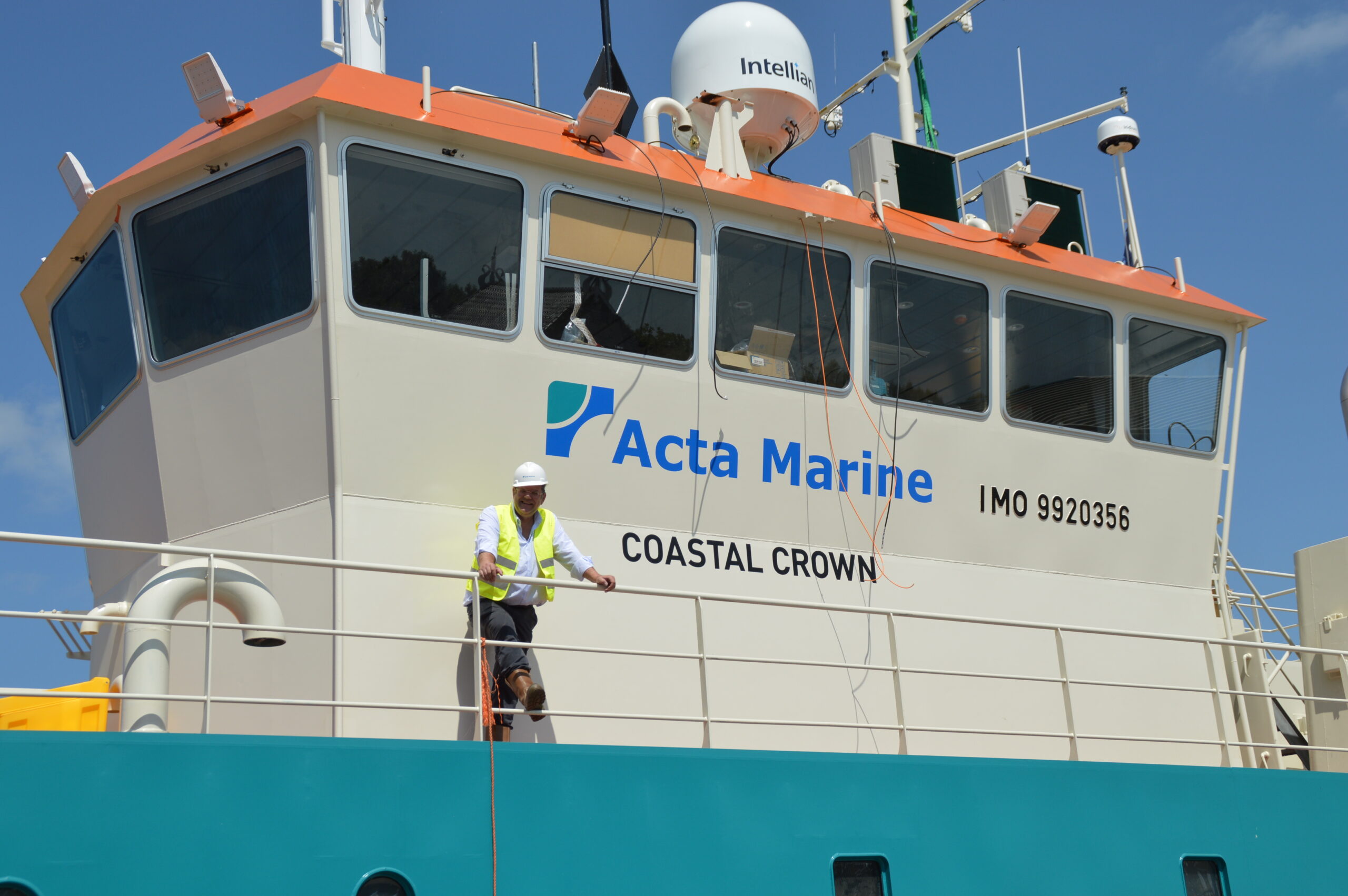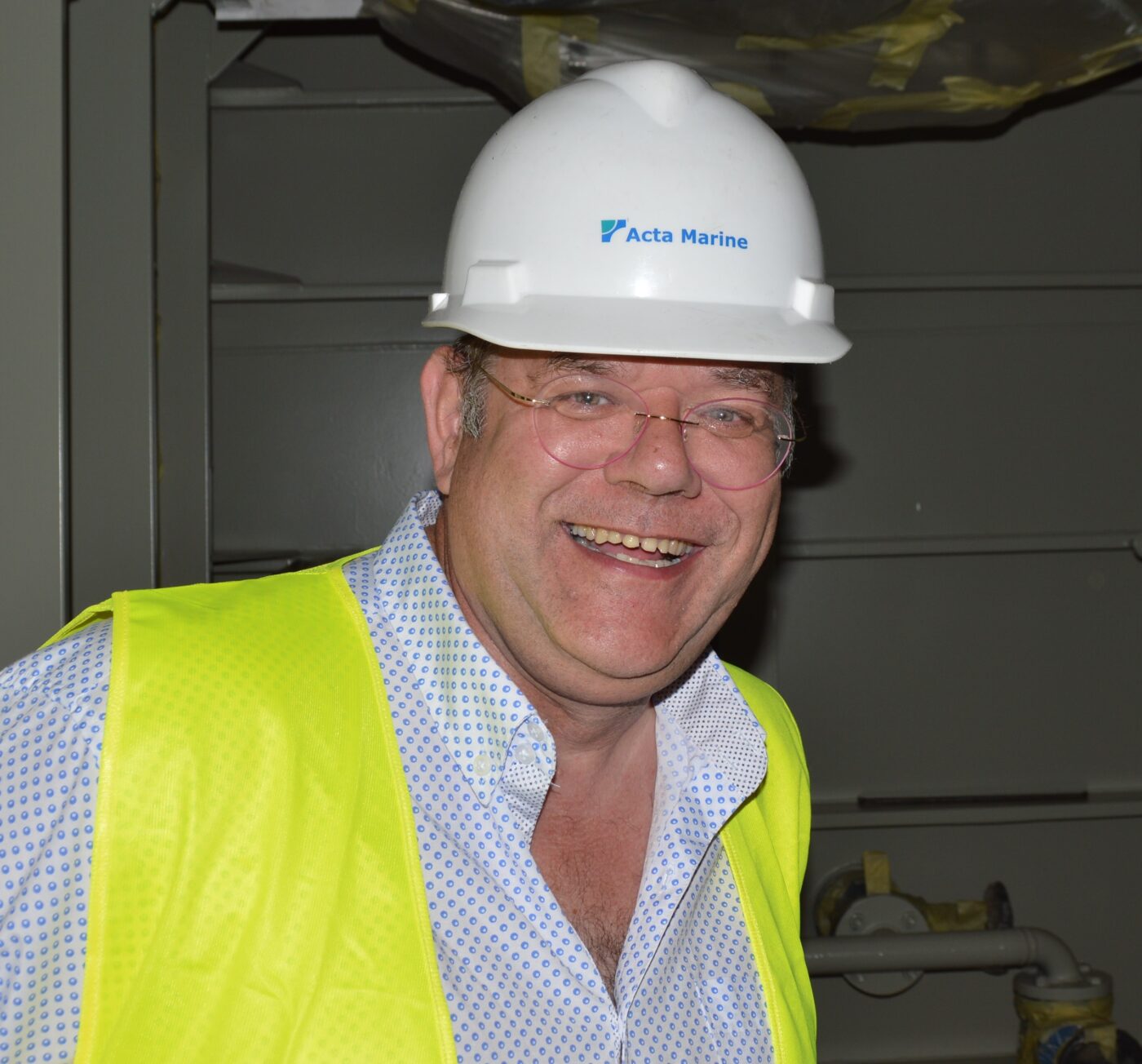Bert joined the Workboat Association general committee this year, find out more about his beginnings and what motivates him within his role at Acta Marine.
What is your current role within Acta Marine and what are your responsibilities?
I’m commercial manager within Acta Marine and as such responsible for the European West Coast, UK, Ireland and the Americas. I’m responsible for marketing our fleet of workboats, fixing contracts with a variety of clients in Dredging, Marine construction, Aquaculture, Offshore energy etcetera. From time to time if we’re very busy starting up projects I help out in the Operations department for managing our boats that have been assigned on projects.
What do you believe are the key successes within Acta Marines offering?
The people are our most important factor contributing to Acta Marine’s success. We have many long term employees and most of our masters are in-house trained and gone through the ranks. As the majority of workboats comes from a limited number of builders, there’s no bad boats on the market, but it’s really the people that makes a vessel, a team, a company successful.
As a family-owned company with long-term focus, we take CARE of all aspects of our business; our clients, business partners and shareholders, our people, our assets, and the environment we work in.
We are:
Collaborative; Through long-term relationships with our clients and stakeholders, we cooperate in a transparent way. We are service-orientated, taking care of our clients’ needs and requirements.
Accountable; Stewardship is in our DNA and we operate in a safe and responsible manner. We take ownership of our actions, of our behaviour and treat people and our planet with respect.
Reliable; We act with integrity and do everything in our power to maintain our reputation as the trusted marine support partner. We honour our commitments and consistently deliver quality services with care for the safety and wellbeing of all involved and the environment we work in.
And last but not least we have
Expertise; We build on our experience in offshore and coastal waters and continuously look for the best solutions and innovations that fit the needs of our clients and the industry as a whole. Utilising our knowledge and expertise, we explore new opportunities, technologies and markets and proactively improve our operations.
How long have you been working for Acta Marine and how has the offering changed over time?
I’ve been with Acta Marine since 2016, but previously I worked for over twenty years in a sister company from the same shareholder. The company culture is much the same as before, but Acta Marine is a much smaller company compared to my previous employer which makes the challenges and opportunities different. What I have seen changing in recent years is that market demands change, more and more clients are looking for sustainable solutions, at Acta Marine we try to develop realistic scenarios and aim our investments similarly; no futuristic pies in the sky, but robust and proven technology to the latest standards, together with our strong operating experience contributing to reducing our emissions and raising our efficiency.
When and where did you first begin your interest for commercial vessels?
My dad was a commercial skipper and barge owner, I’ve spent the first seven years of my life living on board a river barge working the European inland waterways. From as long as I can remember I’ve had interest in commercial vessels, on the water there’s always action. I’ve also been very decisive from a young age onwards about how I saw my career, young people currently have so much choice in education and professions they may want to study for, I did had the choice as well, but have never ever considered doing something else than to work with boats and barges. If I’d had to do it all again, I’d probably make the same choices again! It’s literally in my blood.
What did your early career look like and what functions have you covered?
I was trained and educated as a barge skipper, had my first command on a tanker barge at the age of 23. From the barges I switched to the international dredging industry at the end of the 1980’s when Volker Stevin Dredging offered me a job as a master on a hopper barge, pretty much comparable to the river barges I was used to, but seagoing. I spent a year in West-Africa on a large scale dredging project, whilst the international dredging industry was going through some tough times. Along the way I became acquainted with dredgers and dredging methods, I carried on working for Volker Stevin as the dredging market started picking up again towards the end of the 1980’s and early 1990’s. I did a lot of work in the Far East, Indonesia, Singapore, Hong Kong and Malaysia, I’ve been to a lot of beautiful places. At one point I became involved in a dredging project for Van Oord’s Offshore department, (who were deep sea rock dumping specialists at the time), but with little experience in dredging. From this project onwards I decided to stay working offshore, back in those days working offshore was a time for time work/leave rotation (1:1), whereas dredging still did worked twice as much as your time off (2:1). Until 2013 I remained working offshore as a superintendent at first, later as Offshore Construction Manager on large DP installation vessels. A lot of work was done in the harsh environment of the Norwegian North Sea, Norway being a natural supplier of engineered rock and aggregates, but also on the Southern North Sea, in Australia and even in Taiwan.
This year you joined the WA committee, what was your interest for nomination?
I have been following the work of the WA for a number of years now, since I was first introduced by a colleague after Acta Marine took over a UK flagged fleet of CTV’s and was instantly impressed by the influence the association has with all stakeholders. First and foremost the relationship with the British flag state off course, but also different EU administrations, which proves to be of particular value for arranging a number of practical things after the Brexit. Although I’m not particularly assigned with safety within Acta Marine, I like the role of and ideas behind the Safety Forum. Last but not least it’s good to get acquainted with and get to speak to our industry partners on a regular basis. Besides this, being on the committee is an honourable position, it is a good starting point to remain actively involved in the work of the association and extend my knowledge and network within the workboat sector.
How has Brexit affected an Anglo/Dutch company such as Acta Marine?
We still have to wait and see the final outcome of it. So far we have had no specific challenges we could not overcome with regards to our crew travelling, cabotage or our vessels being rejected on either sides of the North Sea, but we are definitely preparing for stricter requirements to come. Luckily the visa requirement for our EU seafarers entering UK waters on offshore wind projects has been postponed by another year. We expect this to have a reverse effect from the EU; if EU seafarers cannot work and travel freely in and out of the UK, the same may become applicable for our UK seafarers working inside the EU. Visa requirements and restrictions on cabotage both ways will obviously not make our operations easier or more efficient.
Do you ever get involved with the larger >500gT ships within Acta Marine?
It is not my focus, the current large vessel fleet is managed from our office in Rotterdam as opposed to our workboat operations which are based from our Den Helder office. But as a whole, we are always looking for fleet innovation and expansion opportunities, as such I take part in internal discussions to realise the opportunities for an above 500GT work vessel within our fleet, this would bridge the gap between our work boat fleet of <500GT vessels and our large walk-to-work vessels. I look with interest at developments and shipbuilders who are pioneering with different conceptual vessels >500GT. As our company is ISM certified, and some of our <500GT vessels as well, there is no big threshold for Acta Marine to build or buy >500GT vessels, other then market opportunities and cost-effectiveness.
Has there been any stand-out highlights within your workboat career?
Our 15 meter ‘first generation’ CTV’s were struggling to meet market demands/requirements when I first joined Acta Marine. In Offshore Wind the expectations with regards to cargo capacity, workability and range has gone up quite significantly over the past years since they were built, Offshore Wind Parks are being constructed further from shore than in the early days and wind park owners seek to maximise asset effectiveness to reduce overall production costs. Overall this made these boats very had to market in the maturing Offshore Wind industry, I was the first promoter within Acta Marine of employing these vessels on nearshore dredging and construction projects for survey and crew transport. We had an opportunity back in 2016 to send one of the boats to a project in Morocco, I had to overcome quite some resistance within our organisation to make this happen. We did it, very successfully in fact and eventually we remained on the project for almost three years, meanwhile the other 15 meter boats were all employed on similar projects outside of offshore wind. It has made them the most successful units within our CTV fleet, in utilisation and also financially. I pride myself in having been a first-time advocate to look outside the box and into these markets. Obviously Acta Marine’s traditional client base, with many dredging and construction companies included, has offered many opportunities over the years since, especially now we also have a track record with these vessels to example their benefits outside of wind. Although once being out phased in the industry they were intended for, these units have typically worked all year round for the past couple of years with great reliability.

Bert on board Acta Marine’s bespoke-designed new build ‘hybrid propulsion’ large Multicat ‘Coastal Crown’.

